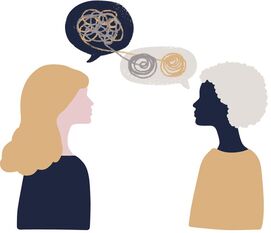My wife calls this “meeting with no.” In essence, I’ve set my default to no, so turning to a yes requires effort. This is not trivial. Humans love to go with the default. Setting a default is one of the most consistent nudges employed to alter behavior. Research has shown the power of default in everything from organ donation to 401K sign-ups. However, what happens when the default option produces an undesirable behavior? My no paints a conversation in a negative light. My no creates an uphill battle just to get to neutral ground. If no is the first instinct, a yes is hard to achieve. But isn’t there something to be said for the first instinct? The common advice when you face a tough decision is to ‘go with your gut’. If you are taking a multiple-choice exam and can’t decide, trust your first instinct. Research, however, says otherwise. Just as I, upon deeper consideration, end up wanting to meet friends or go to the farmer’s market, our gut choice is not always the correct one. While some decisions benefit from intuition, others require deliberation. In four studies, Kruger, Wirtz and Miller (2005) found that students more often changed their answer from incorrect to correct than vice versa. They called this the first instinct fallacy, which is directly counter to what SAT and GRE prep courses had long lauded as the ideal strategy. Humans are programmed this way. Imagine you are back in high school, and the teacher hands you your graded test. You notice for one question, you erased the correct answer to put the wrong one. That feeling looms much larger in our memory than the handful of questions where you did the opposite. In fact, you may not even notice the answers you correctly changed. The point is that we trust our first response, which when can lead to faulty answers for complex problems. I argue that this fallacy applies to discussion of race in America. There is a moment in every TV or podcast interview, political or economic debate, or personal conversation about race where you can determine if a meaningful discussion will occur. It happens almost immediately after the subject is broached. The response could be non-verbal, like a frustrated sigh, a roll of the eyes, a dismissive laugh, a shake of the head. It could be spoken out loud, like “America isn’t racist,” or “We solved the issue of racism,” or “I don’t see color,” or “We are living in a post-racial world,” or more dismissively, “Oh not this again.” The person has met the conversation with no, hitting the shutoff valve that prevents the discussion from even starting. I get it. Remember, this is my jam. My first instinct is to say no to anything that disrupts my routine, makes me uncomfortable, wasn’t planned, or requires effort. A snap judgment is made by me (“We don’t need more kale”) before the idea (“Let’s have a morning walk at the Farmer’s Market instead of the bike path”) has even sunk in. It’s no wonder that discussions of race are met with no, particularly by white people. They are inherently uncomfortable, they disrupt the routine of white privilege, they force us to change our plans, they require effort. But this is a deliberative—not intuitive—cognitive process. At the risk of oversimplification, an open mind may be the essential ingredient to engage in a dialogue around race in America. If the gut response is to deny existence of the problem, the conversation never happens. The answer has been marked and won’t be changed. However, this is not a true/false test. This is not even a multiple-choice quiz. This is a working document, which will have erasures, strikethroughs, notes in the margins, post-its, corrections, highlights, and scribbles. As I’ve written about before, you don’t have to be a subject expert and we are going to make mistakes. The goal is not for white people to feel personal shame and responsibility for all of the injustices of human history. The goal is to engage in dialogue that leads to meaningful action, social change, equitable opportunity, and policy reform. While the premise is simple, I acknowledge that the execution is not. By opening the door to the conversation, we embrace discomfort and vulnerability, we expect to change our plans, we are open to disagreement with friends and interruption to our routines. But the right answer is not always the first one or the simple one. Occam’s razor does not apply to this context. Complex issues require complex dialogue. Having an open mind is key.
0 Comments
Leave a Reply. |
AuthorColin Gabler is a writer at heart. Archives
May 2024
Categories |

 RSS Feed
RSS Feed